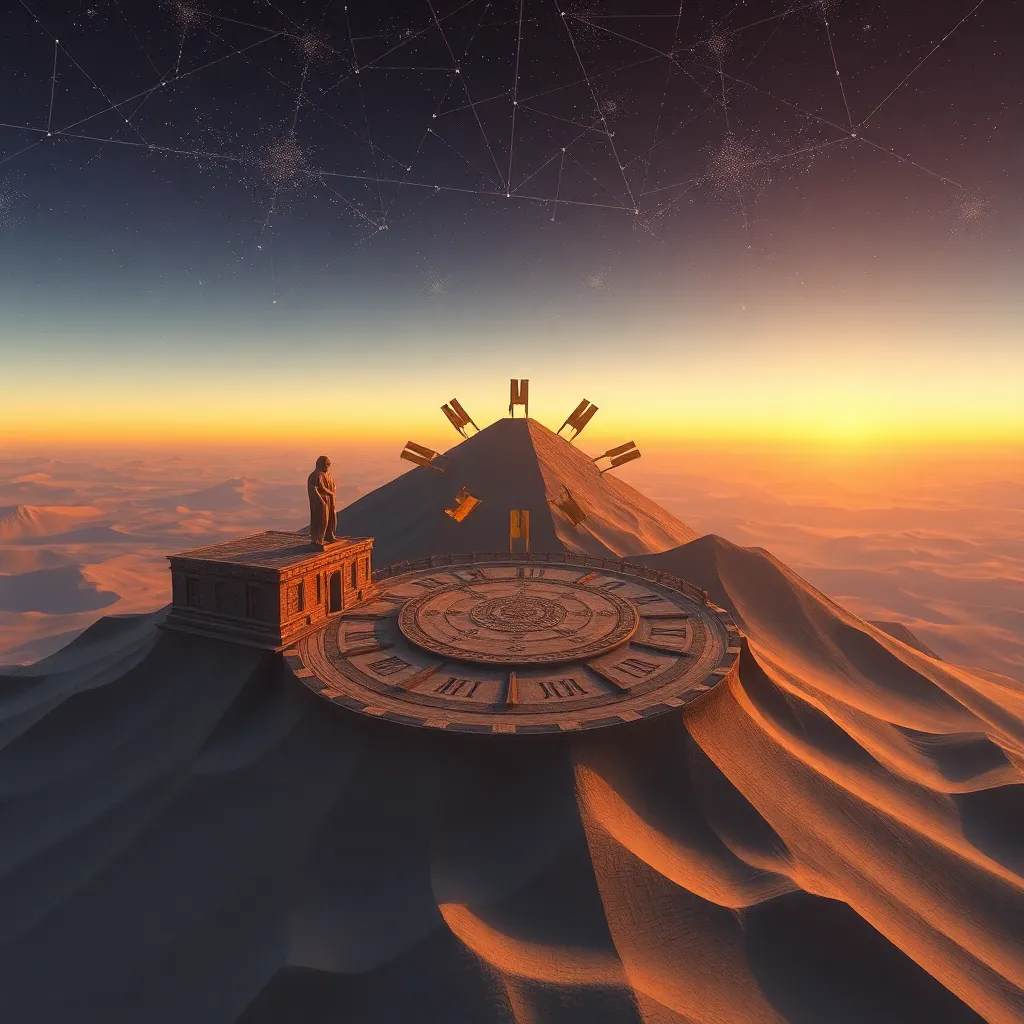The Myth of the Celestial Calendar: Time in Egyptian Beliefs
I. Introduction
Time held immense significance in ancient Egyptian culture, intricately woven into their daily lives, religious practices, and agricultural cycles. The Egyptians viewed time not merely as a linear progression but as a cyclical phenomenon, governed by the rhythms of nature and the cosmos. Central to their understanding of time was the celestial calendar, a system deeply rooted in myth and spirituality.
This article aims to explore the relationship between Egyptian beliefs and their conception of time, focusing on the origins of the celestial calendar, the role of deities, the symbolism of celestial bodies, and the connections between time and mortality.
II. The Origins of the Celestial Calendar
The historical context of timekeeping in ancient Egypt reveals a civilization that was advanced in its understanding of astronomy and time measurement. The Egyptians developed a sophisticated system for tracking time, which included a solar calendar of 365 days divided into 12 months, each consisting of 30 days, plus an additional five days to account for the solar year.
The celestial calendar was structured around significant astronomical events, particularly the heliacal rising of the star Sirius (Sopdet), which coincided with the annual flooding of the Nile. This event marked the Egyptian New Year and was essential for agricultural planning.
When comparing the Egyptian celestial calendar to other ancient timekeeping systems, such as the Babylonian lunar calendar, it becomes evident that the Egyptians placed a greater emphasis on solar cycles, reflecting their reliance on the sun’s regularity for agricultural success.
III. The Role of Deities in Timekeeping
In Egyptian mythology, several major gods were associated with time and celestial events. Among them, Ra, the sun god, was paramount, embodying the daily cycle of sunrise and sunset. Thoth, the god of wisdom and writing, was also crucial, credited with creating the calendar and overseeing the passage of time.
Myths surrounding these deities illustrate their influence on calendar systems:
- Ra: His journey across the sky each day represented the cycle of life and death.
- Thoth: He was believed to record the deeds of the dead, ensuring justice and order in the afterlife.
Rituals and ceremonies related to celestial events were integral to Egyptian culture, with festivals marking important astronomical occurrences, such as solstices and equinoxes, which were believed to influence agricultural cycles and social order.
IV. The Symbolism of the Stars and Celestial Bodies
Stars held profound significance in Egyptian cosmology, often viewed as manifestations of the divine. The Egyptians believed that celestial bodies were not only physical entities but also representations of gods and pharaohs.
For instance, the constellation Orion was associated with Osiris, the god of the afterlife, symbolizing resurrection and regeneration. Similarly, the Milky Way was often seen as the celestial Nile, linking the heavens with the earth.
Astronomical phenomena were interpreted through the lens of mythology, with the movements of stars and planets seen as divine signs. Eclipses and unusual celestial events were often viewed as omens, signaling the will of the gods.
V. Seasonal Cycles and Agricultural Practices
The connection between the celestial calendar and the Nile’s flooding cycle was crucial for the agricultural practices of ancient Egypt. The annual inundation of the Nile, which began around the time of the heliacal rising of Sirius, was essential for replenishing the soil and ensuring a successful harvest.
Seasonal changes dictated the agricultural calendar, influencing when to plant and harvest crops. Myths explaining these cycles often involved divine beings:
- Osiris: His death and resurrection were linked to the flooding and fertility of the land.
- Isis: As the goddess of agriculture, she was believed to bless the fields and ensure bountiful harvests.
This divine connection between celestial events and agricultural cycles underscores the Egyptians’ reliance on their understanding of time for survival and prosperity.
VI. The Relationship Between Time and Mortality
Egyptian beliefs regarding life, death, and the afterlife were intricately tied to their concepts of time. The celestial calendar influenced funerary practices, with the timing of rituals believed to affect the soul’s journey in the afterlife.
Myths surrounding the journey of the soul often depicted a cyclical passage through time and space, reflecting the belief in rebirth:
- The Weighing of the Heart: In this ritual, the deceased’s heart was weighed against the feather of Ma’at, symbolizing truth and justice, determining their fate in the afterlife.
- The Duat: The realm of the dead, where the soul navigated challenges, was viewed as a reflection of the celestial order.
Thus, time was not merely a measure of earthly existence but integral to the spiritual journey beyond death.
VII. The Decline of the Celestial Calendar’s Significance
Over time, historical events led to changes in Egyptian timekeeping practices. The conquest of Egypt by foreign powers, such as the Persians and later the Greeks, introduced new calendar systems that influenced traditional practices.
The impact of these foreign influences resulted in a gradual decline in the significance of the celestial calendar, as it became intertwined with other cultural methods of timekeeping.
Despite this decline, the legacy of the celestial calendar continues to resonate in modern understandings of time, as the solar year remains the basis for contemporary calendars.
VIII. Conclusion
In summary, the celestial calendar was a cornerstone of ancient Egyptian beliefs, reflecting their understanding of time as a divine and cyclical phenomenon. The relationship between gods, celestial bodies, and the seasonal cycles of agriculture illustrates the profound interconnectedness of time, spirituality, and daily life in ancient Egypt.
These enduring myths and their cultural significance remind us of the complexities of time in human experience. The ancient Egyptian concepts of time continue to influence modern thought, inviting reflection on how past civilizations shaped our understanding of the universe.




